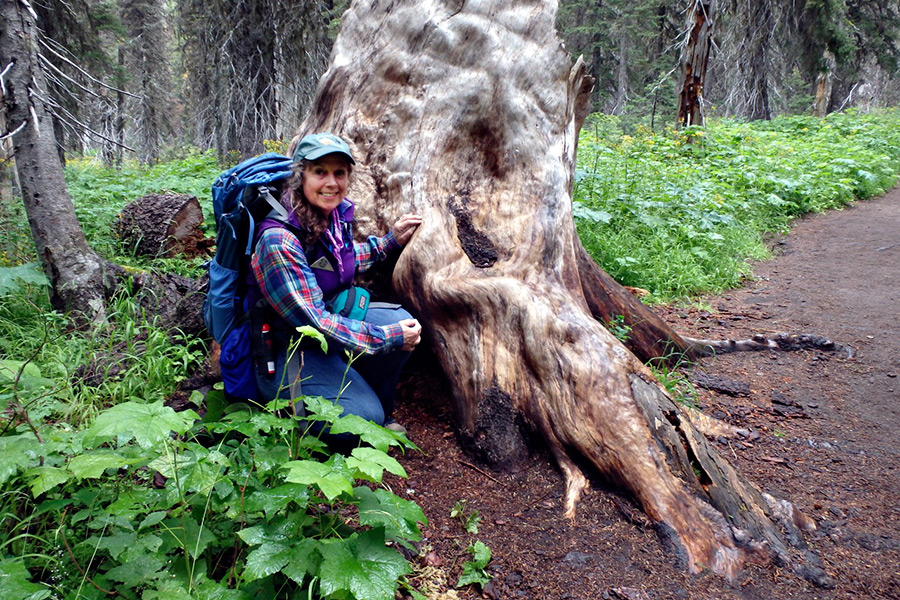Opponent of Scenic Helicopter Tours Honored for Stewardship
Citizens’ group has called on Interior Secretary to permanently ground Glacier Park overflights
By Tristan Scott
An anti-noise activist is being honored for sounding off about helicopter tours in Glacier National Park, where she found the quiet had been eroded over the years as visitation increases.
Last year, West Glacier resident Mary T. McClelland spearheaded an effort to restore natural quiet to Glacier National Park, drafting an open letter to former Secretary of the Interior Sally Jewell in an effort to quell the landscape by ending scenic helicopter tours over the park by 2017.
The petition generated more than 31,000 signatures, and while McClelland hasn’t succeeded in permanently grounding helicopters near her beloved park, her efforts to protect the soundscape are being recognized this month by Headwaters Montana, which in 2011 established the Jack Potter Stewardship Award to honor Jack Potter, a 40-year park veteran who served as chief of science and resources.
McClelland led the effort on behalf of Friends for a Quiet! Glacier Coalition, which launched a website to gather signatures for the petition and formed a coalition of 29 local and national stakeholders. The petition garnered 3,200 comments supporting restrictions on helicopter overflights in Glacier Park.
Dave Hadden, executive director of Headwaters Montana, said the Jack Potter Stewardship Award has traditionally gone to a National Park Service employee, but McClelland’s spirit and conviction as a citizen made her a prime candidate.
“This is the first time we have given it to someone who is just a citizen, someone from outside of the park service,” Hadden said. “The helicopter tourist business has grown exponentially in recent years and it is really beginning to infringe on the public’s enjoyment of Glacier’s natural environment, so for someone like Mary to take this on, it is a daunting challenge. It takes courage. But there is a real issue that needs to be looked at about what is the appropriate level of tourist development in and around Glacier National Park.”
McClelland said she launched the effort after observing an uptick in helicopter overflights and learning that efforts to ban them go back decades.
“Glacier’s solitude has been shattered by hundreds of helicopter overflights,” McClelland said, “and the incessant noise pollution endured by wildlife and visitors is destroying what Glacier stands for — the pinnacle of natural beauty and tranquility.”
McClelland said three decades after noise pollution created by helicopter tours in Glacier was identified as a priority problem at Congressional hearings, 17 years after it was listed as a critical issue in Glacier’s General Management Plan, and 16 years after passage of the National Parks Air Tour Management Act, not much has changed.
“We still have no peace in Glacier,” McClelland said. “Today, more than 500 helicopters per month fly sorties over our nation’s only international peace park and World Heritage Site.”
According to McClelland, Friends for a Quiet! Glacier Coalition includes the Sierra Club, the Alliance for the Wild Rockeis, the National Parks Conservation Association, Wilderness Watch, the Swan View Coalition, Friends of the Wild Swan, the Montana Ecosystems Defense Council, the North Fork Preservation Association, and Headwaters Montana.
Jim Kruger, who owns Kruger Helicop-Tours, said the noise pollution generated by motorcycles touring the Going-to-the-Sun Road creates far more of a ruckus than his helicopters, but there’s no proposal to ban Harley Davidsons from Glacier.
Kruger said his company has been flying visitors over Glacier for the last 37 years, and although he’s limited to 750 flights annually, he rarely approaches the limit, flying an average of between 300 and 400 tours during the summer season.
The Federal Aviation Administration requires air tour operators to fly less than 5,000 feet above national parks or abutting tribal lands.
According to McClelland, Glacier National Park administrators have said for decades that their hands are tied, abrogating authority to FAA jurisdiction.
According to McClelland, in 2015, fewer than 1 percent of visitors to Glacier National Park took recreational helicopter air tours.
“It takes real guts, dedication and a lot of hard work to take on an issue like this as a citizen-advocate,” Hadden said. “Glacier Park helps drive the local economy, and as a crown jewel in our national park system, we need to protect its natural features — like natural quiet — that make it special in the first place.”